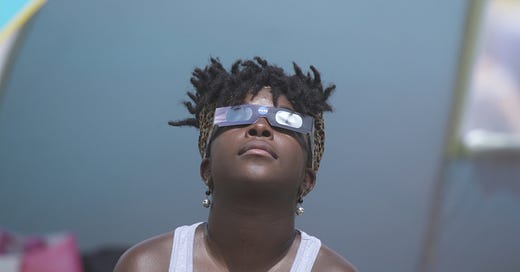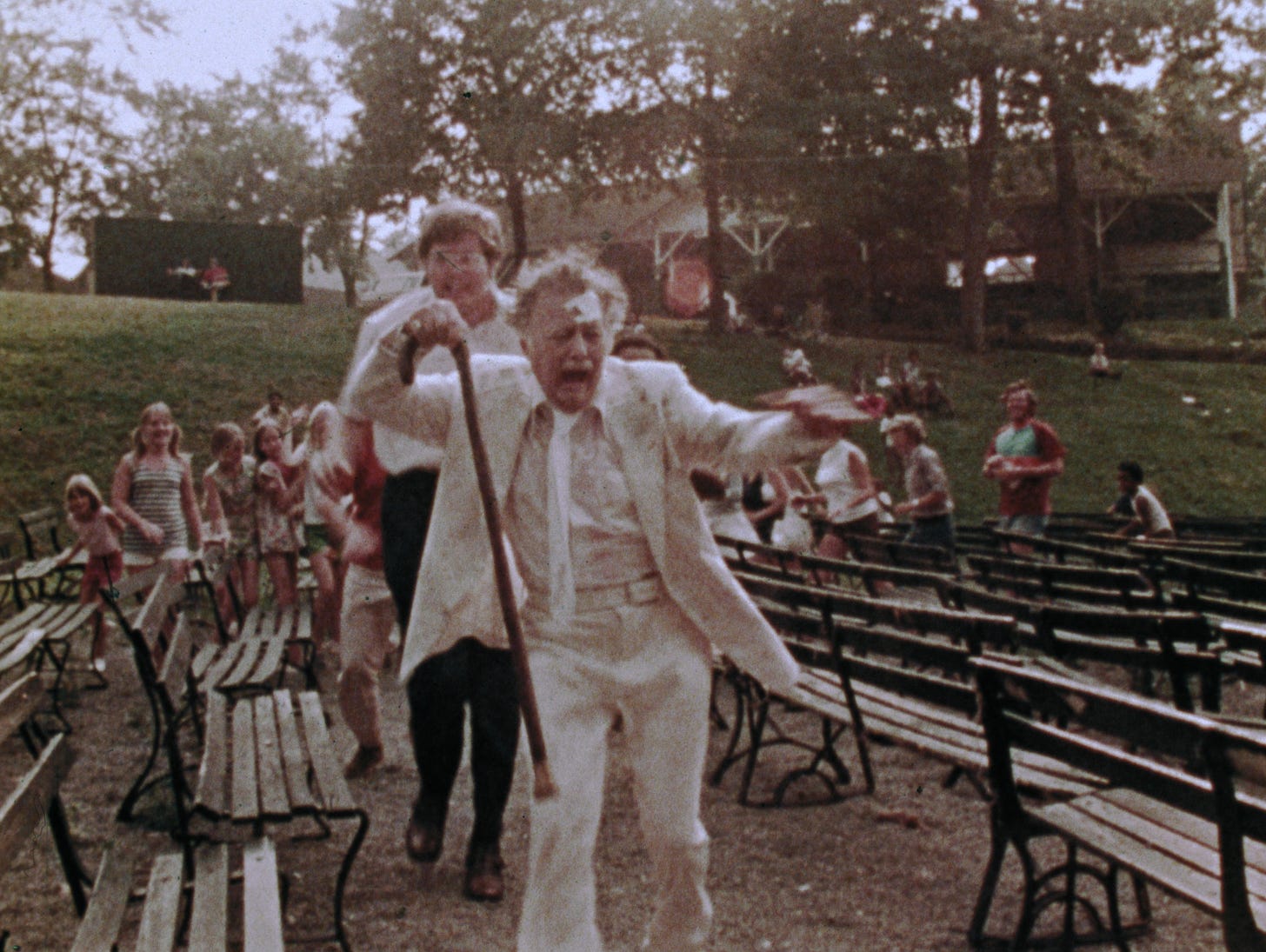Movies are Lies, and Time Doesn't Make the Heart Grow Fonder (this is not a book title)
Now playing/streaming
All Light, Everywhere
The resolution of photographs and films from the early days of both inventions always strikes me hard. There’s a beauty to these fragments of time and narratives of mind and memory that can’t ever be compared to modern video. Is it the chemicals used in developing the pictures and movements that accentuate such magic? Is it the controlling eye of the poet holding the camera? The camera itself? It’s argued in Theo Anthony’s latest film essay All Light, Everywhere that everything photographed is a kind of lie, or rather a truth that’s different from what the photographer and the observer may intend and perceive respectively. I still wish to believe it’s all in the chemicals and the format, but as is said often, “Wish in one hand, and…”
When I think about old silent films, like The Great Train Robbery and the scene of the man firing a gun at the camera, the basic tale of, well, a thief shooting directly at me, comes up. It’s a simple premise that could be contrasted with gimmicks and attractions like 3D presentations, but All Light straight up tells us that there are complications inside this simplicity: Where is the camera? Who and what is behind the camera? What is the camera capturing and for what purpose? When all questions are considered, worlds of stories and truths open up and crumble at the same time. Director Theo Anthony bounces from one setting to the next - a body camera manufacturing plant, community surveillance meetings, police training classes, etc - to heavily question various states of control, from what is exerted by the state to those inherent in day to day photography. That gunman in the old movie continues to shoot my way, but there’s a blind spot that I’m not catching. Or can’t catch in the parameters I’ve seen it in.
No, my brain is not hurting nor are my eyes straining.
All Light, Everywhere isn’t merely impressive in making a clear argument for thinking past that which we think we see, it’s shocking too. We get a tour of Axon, a company that makes tasers and camera technology for law enforcement, from a very excitable and convincing hypeman. At the start, he opines the virtues of an open floor plan in the main office. “Transparency,” he says. Immediately after, he points to another office that sits above the open one, which is surrounded by dark black windows. The need for these windows at all? To show that some things are best not exposed, he suggests, thus contradicting himself and stating out loud the thesis of the film being made at that moment. At once, we’re seeing stories being formed by all available players: Capturer, device, subject, and observer.
All Light, Everywhere isn’t an acid trip, but it is a trip nonetheless, one that is as open-minded as it is confident in argument and form. Theo Anthony’s direction doesn’t command anyone or anything, and doesn’t have to. His film informs through mostly just watching and recording, letting the information gathered speak volumes, only accentuated with an eye for composition and a teasing brain for all that’s in and not in the given frame. It’s pretty stunning.
When a cop can view footage before giving testimony, the tale changes to match what is and isn’t fired upon by the lens. New worlds begin, old ones crumble.
Through subtle and patient camera movement and editorial pacing, and through voice-over confrontation of history’s inconvenient facts, All Light, Everywhere captures with grand humility the troubling nature of perception and storytelling, not to mention the weaponization of both. It’s not just the best documentary-like application of Orson Welles’ F for Fake, but probably the best film of 2021. This is no political treatise mind you, as it’s entirely essay and consideration from start to finish.
As a critic, I’m almost confounded as to how a review for this one ought to go, but having just written it, I suppose I have the answer. My answer. My story, or view of it anyway.
Is it a lie? Screenshot this page and consider the angles. Light is everywhere, so expose my blind spot, please. 5/5.
All Light, Everywhere is now playing in theaters.
The Amusement Park
In the heavily animated documentary Birth of the Living Dead, where the late great filmmaker provocateur George A. Romero goes over the making of his classic Night of the Living Dead, one story of his from early on in his career pokes out from the grave - so to speak. He tells of doing production work for Mister Rogers’ Neighborhood, specifically the episode where Rogers has his tonsils removed. We see, rather painstakingly, clips from the show, now with an eye for just how absurdly creepy it all is. Romero then states with a smile how that was the scariest thing he was ever part of.
This sums up Romero to a fault.
His movie The Amusement Park does this as well, the film itself and its new status. Having been mostly lost for decades, the good folks at IndieCollect were able to clean it up and restore it, in an Other Side of the Wind kind of scenario (though much easier to release). It’s a movie born from a contracted assignment - an educational picture on ageism as wanted by the Lutheran Society - and taken well past its creative extremes, becoming something both on point and completely unexpected. It’s an accomplishment in hired production work, a grand experiment in independent filmmaking with limited resources, and a lesson in how for us to go forward creatively we should look back attentively.
Romero continues to teach.
The movie reminds me of Jim Henson’s The Cube, and George Lucas’s early plans for Apocalypse Now - renegades being renegades, in a time of massive change (the late 60s, early 70s). The Amusement Park follows an elderly gentleman who, after being warned not to go outside by a disheveled old man in a white room, chooses to step on through and visit an amusement park for a lovely day. Things go downhill quickly, as his time in the park reflects what can be “looked forward to” for all older individuals. This is the story of the film, bookended with two pieces from lead actor Lincoln Maazel who tells us, out of character, the real conditions that will be faced by real people. Indeed.
For this bleeding heart, The Amusement Park is as bizarre and terrifying and uncomfortable as any movie can be. The gentleman experiences such abuse and discrimination and ignorance, all while trying to give everyone around him politeness and the benefit of the doubt. Of course, everyone has a limit before being weighted down by punishment. We witness flashes of the Grim Reaper on various rides, almost direct the man around the park, preparing him for an afterlife as unfair as his time on Earth. Crueler than that, employees and customers are either indifferent or aggressively hostile towards him, treating him like trash and cattle in fits and bursts.
It’s amazing too how the location is composed by the photography and the cutting to really emphasize the terror of the amusement industry that goes hidden behind clown makeup and balloons. It outdoes Escape from Tomorrow in this manner, never having to add evil graphics to already evil-looking Disney park designs. There’s creepy ambiance and sounds throughout, there’s incredible tension that only compounds with each minute, and there’s startling but simple sadness and tragedy that’s granted by the finish. It’s no wonder the Lutherans turned the film away for being too horrific.
Mind you, this is no Eli Roth venture into torture porn. I didn’t mean that when the word “horrific” came up. I meant that The Amusement Park uses our basic fears and anxieties and brings them to the forefront in a place most odd for such things to be experienced, but also most communal as well. I’m thankful Romero didn’t choose a movie theater as the setting.
The Amusement Park packs quite the punch, making for an impact that’s more excitable than disturbing. After viewing, I was left wanting to applaud the film and its makers, as it lives both as testament to talent and a landmark of punk before punk. It’s confrontational and great. It’s George A. Romero to a satisfactory conclusion. 5/5.
The Amusement Park is now streaming on Shudder and playing in theaters.
Dear Moviegoers,
The Moviegoing Bill is a labor of love and an exercise in expression. If you like what you read, please share it around and consider subscribing.
:)






